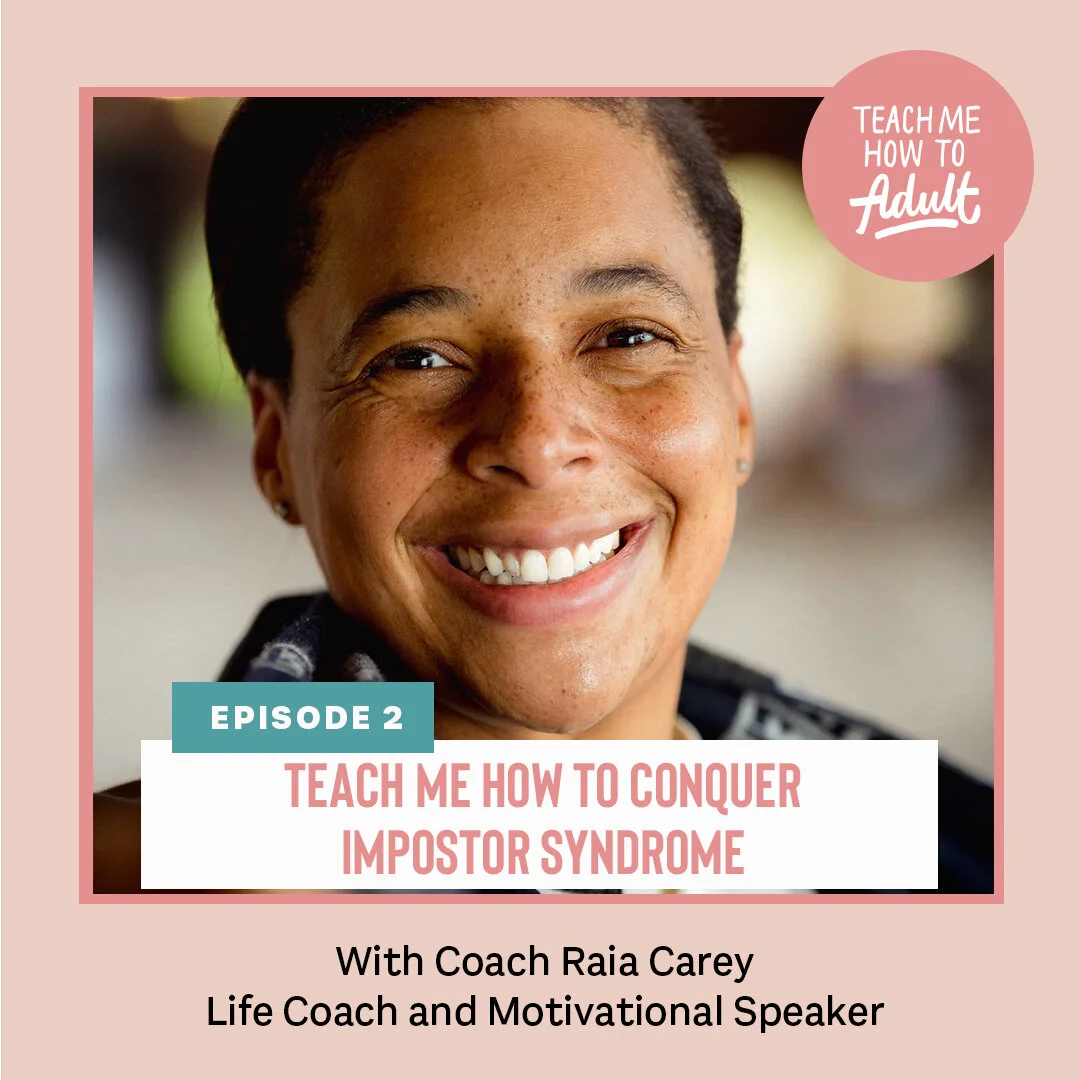Episode 02: How To Gain Confidence and Overcome Impostor Syndrome
Raise your hand if you’ve ever felt like you’re not good enough, or that you don't deserve the job or promotion or opportunity that you’ve earned. That’s Impostor Syndrome talking, and most of us (70% of the population!) have experienced it at some point, in the workplace or our relationships or passions. It's super common among high achievers, creatives and women.
But fear not! Today we’re talking to the expert, Raia “Coach” Carey, who knows a thing or two about how to stop Impostor Syndrome in its tracks. She’s a 3x certified life coach and motivational speaker who specializes in confidence, visualization, and career coaching, and she gave us some FIRE strategies for gaining confidence and shutting down those doubtful voices in our heads.
What does Impostor Syndrome sound like?
One of the most common signs of Impostor Syndrome is that voice in your head that questions: “Who am I to do this?” It shows up as negative self-talk and doubtful narratives we plant in our minds. “It’s the language we use that reflects our lack of confidence,” says Coach Carey. “It’s like, ‘I don’t have any experience, so no one will ever hire me’.”
According to Coach Carey, Impostor Syndrome shows up in the places and spaces you need to be, “Deep down you know that’s where you need to grow, and it’s going to be uncomfortable. There’s something inside you that knows this is the exact kind of growth and challenge you need. Lean into that.”
The truth is, you don’t have to be perfect to be qualified or capable. That’s just a story we tell ourselves. “We want to be perfect before we inspire,” says Carey, “But it’s the imperfections that actually end up inspiring people.”
Signs that Impostor Syndrome is taking over can include burnout, avoidance, and an ongoing lack of fulfilment for perfectionists. It shows up as employees overworking themselves to compensate for a perceived deficit, taking on way too much to prove that they’re worthy. And it can lead to missed opportunities for people who are hella deserving.
The five types of Impostor Syndrome
Dr. Valerie Young has made a career of studying Impostor Syndrome, and she breaks it down into five different types, which helped us understand where and how Impostor Syndrome can creep up.
The Perfectionists: They have extremely high expectations for themselves, and even when they meet 99% of their goals, they still feel like failures.
The Experts: These folks feel like they need to know allllll the info before they’re willing to start a project, and they won’t apply for a job if they don’t meet every bit of criteria in the description.
The Natural Genius: They’re used to things coming easily to them, and when they have to put in more effort, their brain tells them that’s proof they’re an impostor.
The Soloists: These guys feel like they have to accomplish everything on their own, and that needing help makes them a failure.
The Superwoman/Superman: They push themselves to work harder than those around them to prove they’re not impostors. They need to succeed in all aspects of life, and feel stressed when they’re not the best at something.
If you identify with any of these, Coach Carey recommends trying to reframe these thought processes by questioning and countering them. For example, if you’re a soloist who needs to do everything on your own to feel worthy, challenge that idea by exploring the value of forming a mastermind group where you can gain info from other subject matter experts. You’ll likely end up finding empowerment in collaboration after all.
Strategies for overcoming it
“Everyday remind yourself that no matter where you are in life, you can always get to other places,” says Carey. “You have every single thing you need. You can make any change in your life if you take the time to figure it out.” Consider us inspired AF.
Watch how you talk to yourself. Negative self-talk leeches into your subconscious and your subconscious will focus on the harmful statements that hold the most power, like “I could never get that job,” or “I’ll never be beautiful enough to do that thing.” Your words shape your world, so be careful which ones you use. Write down or say positive affirmations out loud to replace those negative thoughts.
Coach Carey is even careful of how she talks about to-do lists. “To-do lists are a choose list. Every single day you get to choose what you do. We always have a choice.”
It can also help to have a positive mantra or quote to keep you going. Coach Carey’s is: “Embrace where you are today in life, knowing it’s not where you have to stay.”
Unpack yourself. Coach Carey recommends starting with the following four questions every night before bed:
What worked well for me today?
What didn’t work well for me?
What fuelled me?
What drained me?
After two weeks you’ll see patterns of what’s helping or hindering you. It helps to track your goals, momentum and behaviours so you can figure out what you want to change or do more of, so take conscious quality time with yourself to check in with no distractions.
Use visualization. Coach Carey uses visualization a lot to help her clients. Here’s what her approach looks like:
Start with imagining what your ideal life would look like if you could change anything you wanted. Let your imagination wander, picture what your day is like, how you are acting and feeling.
Break that down into three top “goals” or “wants” that you can work towards. These could look like a raise in your job, or living in a different city, or a better health and fitness regime.
From there, come up with action-oriented steps and tools you can implement to make those changes.
Ask yourself who is impacted by these changes you would make. Will your family be happier living in a better city? Will a shorter commute allow you to spend more time with your loved ones? This will help form your “why” that will motivate your goal.
Remember, the key to effective visualization is removing the barriers and mental blocks, and creating a safe space to imagine what your life could be like. Because everything you can imagine is possible. So imagine, then come up with the strategies and tools to implement.
Fight fiction with fact. When you’re feeling not good enough for something, make a list of all the things that prove you're just as qualified as anyone else. Get specific and include tangible results that support your value. And keep track of your wins! We naturally hold onto all the times we felt that we failed, but we should be focusing on the times we succeeded. Keep a document or Inbox folder of any praise, kudos and positive feedback that can remind you of your value.
Engage with your hobbies: Do the things that make you feel at your best, says Coach Carey. If you consistently show up feeling your best, you’re more likely to succeed in other areas of your life.
“We live in a time where we did all of our hobbies as kids, and then bills, work, school and society got us to stop,” explains Coach Carey. “But those are the things that truly bring us joy. And joy and happiness are different. Happiness you can find in almost everything, but joy you can only give to yourself.”
Dealing with Impostor Syndrome in your career
Impostor Syndrome can get in the way of pursuing promotions, new gigs and higher salaries or freelance rates. While most people focus on perfectionism and having all the experience before they pursue opportunities, Coach Carey says it’s not always about being the most experienced. “People are way more willing to follow a leader than a boss.”
“Vulnerability makes you way more relatable as a leader. We’re all learning, and people are way more willing to learn with you. Humility is what resonates,” she says.
And what if you don’t have all the answers or expertise in a job interview? Coach Carey suggests approaching an interview by saying: “That’s one area I’m not fully well-versed in, but I’m happy, motivated and willing to learn. I’ve already signed up for a course [to fill that knowledge gap]. If you already recognize the problem and come with solutions, I’d give you the job over the perfectionist.”
And when it comes to gaining the confidence to negotiate your pay, Coach Carey recommends figuring out what number you’d be really happy with, then adding onto that. Even if you just add $500-$1000. And if you get paid that much, the next time you can try adding more. Because you’ll deserve it.































